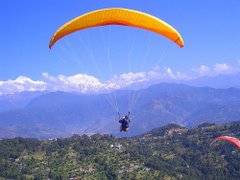Let me begin with current talk on the unification of professional political forces of different ideologies that is, communists, democrats and (far) rightists. The logic behind unification, being floated by the respective political party, is based on mere rhetoric of egalitarian society with republican system of governance in place. And political parties are proposing their own prescriptions. However, going by the run-down history of political events down the road of past twelve months - it looks that 'conditions' that could provide political stability in the country are still missing. It is because current political actors, like in the past, have failed to accommodate all societal forces into the institutional life of the state. Even if political parties are united, it is not going to make much difference in polity because the new system of governance is already forming its own neo-patrimonial classes on top of old classes.
Nepali state is dictated by the Hobbesian nature of element(s). For example, three factors that have immensely dominated Nepali state affairs after Jana Andolan-2 are eight political parties, civil society and mushrooming number of 'interest groups'. These element(s), in one way or the other, are engaged in preserving their political, social, economic, and to some extent, even personal interests (power seekers) at this historic juncture of political turn-over. What has been certainly missing from the current political scene are citizens (those who cannot or are not in a position to organize on their own) who are nowhere to be mentioned.
The embedded elitism in every sector of governance and mere ranting of loktantrik ganatantra (not exhibited in practice) by political parties and the civil society indicate that regime change came about through 'elite settlement' among political parties. Civil society though has played a crucial role for regime change but failed to instil civic values. The convergence between 'old class' and 'new class' of political leaders is motivated by the vested interests as against the common interests. The unstable and mushrooming networks of opposition, the lack of connections between civil society and citizenry at large and absence of nationalist agenda from the political discourse is resulting in the resignation of mass population from elite politics. And this certainly does not herald prosperous future for the country.
The expansion of political society and elite shift of civil society members to political society have corroded the very notion of civil society. In fact state and citizens have been colonised by the political and (un)civil society. The shift of civil society organisations and colonisation of public sphere by political society especially after Jana Andalon 2 (like in the earlier Andolans) is not considered normal pattern of democratic politics. It is rather somewhat abnormal condition and implies thin quality of state of democracy and civil society.
This shift of civil society from civic sphere to political sphere, mere expansion of political society and the rise of various interest groups are maintaining "revolutionary situation" in the country. The reason behind this phenomenon is that professional political class (political entrepreneurs) have grossly ignored the genuine interest of citizens. The political class is simply treating Nepali state as their personal enterprises. It appears that ownership of the state is shifting towards 'eight political parties' and the Kathmandu centred civil society members. Perhaps this could be the reason, among others, why citizens are forming their own groups and exerting pressure against the state on different themes (citizens against the state). Our political leaders have no dearth to understand this broader public uprising. In contrast, they have virtually closed channels of communication with groups who are outside the purview of parties and parliaments. The hijacking of public sphere by political society, urban middle class elites, official civil society and marginalization of peripheral civil society organizations (civic feudalism) also begs some fundamental questions on state ownership (the popular sovereignty for that matter).
The fundamental problem, in this regard, primarily stem due to (1) politicisation and elite shift of civil sphere into the political sphere and vice versa, (2) elite domination in civil society and missing link between members and leaders in civil society organisations and civil society and citizen and (3) patron-client relationship between civil society, political society and their masters (donors and foreign powers). These factors, indeed, are contributing towards incivility and civic euphoria of 2006 is slowly evaporating.
Summing up, prevalence of patron-client links between political society and civil society do not guarantee impartiality; the parties in power, collaborating with their client in civil society (the interest groups) cannot guarantee comprehensive state and civil society relationship that can promote democracy in the country. The existing relationship between political parties and interest group leadership is benefiting only the political parties and those elite with the suitable qualifications to shift into politics. This is how politically relevant social capital and cultural capital is transforming into political capital.
Nepal is now in the throes of a major turbulence and challenges that lie ahead of Nepali politics are multiple and immense. Changes are already taking place in different spheres of society but Nepali state is not prepared to deal with these changes. The wide-ranging upsurge of marginalised and oppressed strata of society has forced us to think beyond formal politics and tap the deeper dimensions of reality. Nepali state is losing internal sovereignty to varied interests groups mainly due to anachronistic political practice which is driven by the Machiavellian notion that 'political power' should not be shared? if the tension and collaboration between political society, civil society and others societal actors are tied up merely to maintain status quo or secure their own positions how can we expect to have a new Nepal? Hence imagination of a new Nepal under the existing scenario is just idealistic, not materialistic.

No comments:
Post a Comment